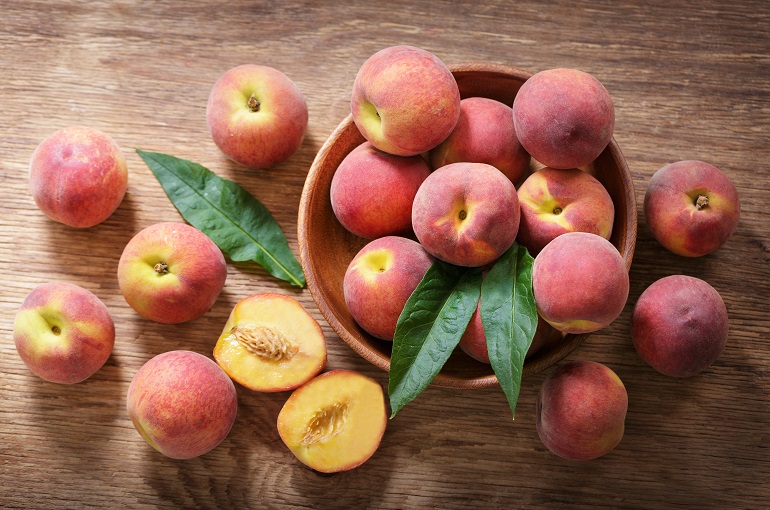Peaches Facts, Uses, Nutritional Value and Health Benefits

This post is also available in:
This post is also available in:
![]() Français (French)
Français (French) ![]() Deutsch (German)
Deutsch (German) ![]() العربية (Arabic)
العربية (Arabic) ![]() 简体中文 (Chinese (Simplified))
简体中文 (Chinese (Simplified)) ![]() Ελληνικά (Greek)
Ελληνικά (Greek) ![]() Português (Portuguese (Brazil))
Português (Portuguese (Brazil))
Peach Fast Facts
- Peach is a deciduous, stone fruit tree
- It belongs to the Rosaceae family
- It belongs to the genus Prunus
- Peaches come second after apples in popularity.
- The tree starts to produce fruits in the second year
- It has an average productive life of 10-15 years
- Peach originates from China and has been cultivated there for more than 2,000 years.
- China is by far the biggest peach producer globally, followed by Spain, Italy and USA.
We classify peaches depending on their use and on whether their stone removes easily as a whole when we cut the fruit in the middle. Thus, we have:
- Table Peaches or Freestones
- Industrial Peaches or Clingstones
Peaches originate from China. Their domestication started around 6000 BC, while by about 4.500 BC Japanese people had already included the tree among their other cultivations. From Japan, the tree and the techniques of its cultivation moved to India during 1700BC. In 300BC it was Greece’s turn, who adopted the tree most probably by Alexander the Great after his visit to Persia. Greeks then distributed peaches to the rest of Europe. In America, the tree arrived most probably through the Spanish colonies during the 16th century.
Nowadays, according to the World’s Atlas, the top 5 peach producers globally are:
- China, with 14.294.973 tonnes
- Spain, with 1.799.685 tonnes
- Italy, with 1.250.721 tonnes
- Greece, with 938.000 tones
- The USA, with 775.189 tonnes
Peach Nutritional Value and Health Benefits
It is widely known that the consumption of fruits and vegetables is the key to a healthy life. Scientists keep saying how important it is to include five portions of fruits and vegetables as part of an overall healthy diet to be able to fight against some of the modern lifestyle-related diseases. Consumption of fresh peaches may provide a relatively high amount of vitamins (mainly A and C), antioxidants, fiber and potassium. Similarly, nectarines are considered to have two times the amount of vitamin A, and potassium and a bit higher amount of vitamin C compared to peaches.
According to USDA, 100 g of raw peaches contain:
- Water: 88.3 g
- Energy: 42 kcal
- Protein: 0.91g
- Total lipid (fat): 0.27 g
- Carbohydrate (by difference): 10.1 g
- Fibre (total dietary): 1.5 g
- Sugars: 8.39 g
- Ca: 4 mg
- Fe: 0.34 mg
- Mg: 8 mg
- P: 22 mg
- K: 122 mg
- Na: 13 mg
- Zn: 0.23 mg
- Vitamin A RAE: 24 μg
- Vitamin C: 4.1 mg
- Vitamin E: 0.73 mg
- Vitamin K: 3 μg
Some important health benefits of peach consumption are:
Peach may boost the protection against Cancer.
Peach is a source of powerful antioxidants like Vitamin C and carotenoids, which have proven action against free radicals. Moreover, according to studies, peach extracts could kill types of breast cancer cells without any adverse effect on healthy cells.
Peach may Boost Heart Health.
Peaches are rich in potassium. According to studies, people who follow a diet rich in potassium and poor in sodium tend to have balanced blood pressure levels. Furthermore, according to another study, people who consume 4069 mg of potassium daily have almost 50% fewer opportunities to die from ischaemic heart disease.
Peach may Boost Skin Health.
Not surprisingly, most cosmetic skin products have vitamin C as their main ingredient. Vitamin C, which we find in sufficient amounts in peaches, has a significant effect on the skin because it participates in collagen formation. Whether consumed orally or applied topically, it may reduce wrinkles and damage from pollution and sun and improve overall skin health.
Peach may Reduce Allergy Symptoms.
Some components that are included in peaches seem to be able to prevent the release of histamines in the blood. These are the substances responsible for expressing allergic symptoms like sneezing and itching. In addition, they reduce inflammation, which is common in allergies.
References
- https://fdc.nal.usda.gov/fdc-app.html#/food-details/1102677/nutrients
- https://njaes.rutgers.edu/sshw/message/message.php?p=Health&m=301
- https://ohioline.osu.edu/factsheet/hyg-1406
- https://dpi.wi.gov/sites/default/files/imce/school-nutrition/pdf/fact-sheet-peach.pdf
Peaches Facts, Uses, Nutritional Value and Health Benefits
Peach Tree Information, Variety Selection, and Environmental Requirements
How to Grow Peaches from Seed (Stone)
Growing Peach Trees for Profit – Peach Farming Guide
Peach Tree Soil Requirements, Soil Preparation, and Planting
Propagation and Pollination of Peach trees
How to Train and Prune Peach Trees
Irrigating Peach Trees – How much Water do Peach Trees need?
Peach Tree Fertilizer Requirements








































































